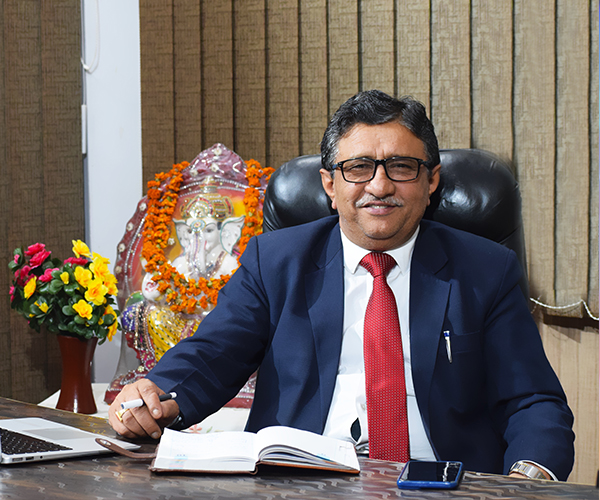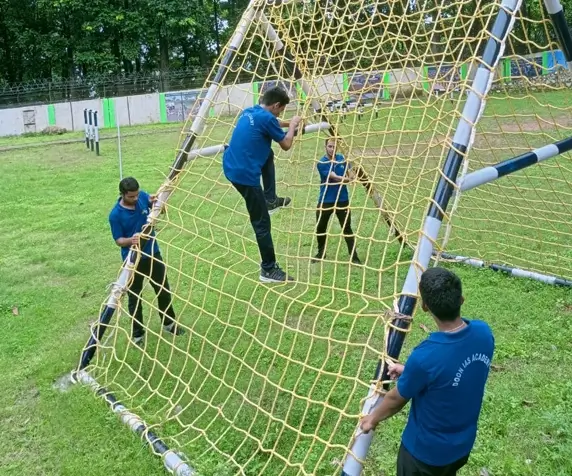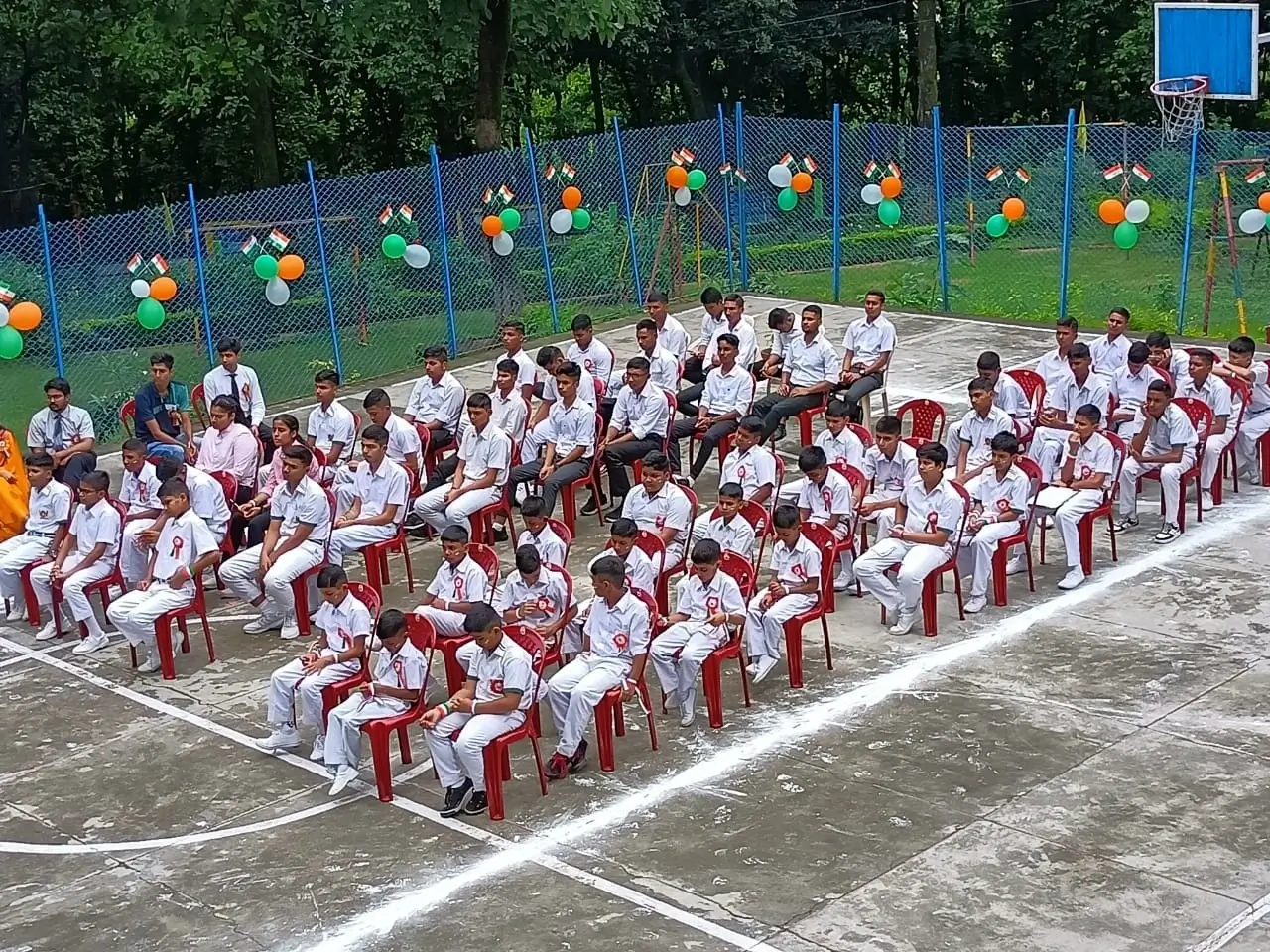-.webp)
National Defense Academy is the joint service academy of Indian armed forces where cadets of the three services, Army, Navy, and Air Force train together before they go on to pre-commission training in their respective service academies. The NDA offers permanent commission as per the service policy. Doon & Defence IAS Academy offers the best NDA Coaching In Dehradun
NDA is located in Dehradun, Uttarakhand. It was set up in 1954. It is spread over 6500 acres with a total built-up area of about 3,00,000 square meters. The NDA has a dedicated Air Field at Tigri for training young cadets in flying activities, which includes paragliding and solo gliding. A Cadet (under training) holds the rank of Subedar Major(SM-Army), Sub-lieutenant(SLT-Navy), and Flying officer(FO-Air Force). General K M Cariappa was appointed the first commandant of NDA. February 10 is celebrated as 'Founder's Day every year to commemorate the day when the first batch joined the academy in 1954. The Cadet wing consists of 8 companies each consisting of 4 troops and an HQ troop with a company commander and company second in command respectively above troops.
NDA Examination is conducted twice a year. The first phase consists of a written exam and the second phase consists of an SSB interview. NDA admission depends on your performance in the written exam as well as the SSB interview
The NDA entrance exam is a pre-requisite for the preparation of IAS, IPS and IFS aspirants in India. The great emphasis on leadership development, and ethical and social responsibility ensures that the bureaucrats of tomorrow do not suffer from moral and ethical bankruptcy. Doon IAS Academy develops students by applying good study ethics in our coaching so that they do not feel demotivated at any stage of their UPSC preparation. We strive to instil self-confidence in students because passing the Civil Services Examination requires confidence in oneself.
The UPSC NDA Exam is divided into two stages for candidate selection. The written exam and the SSB Round are the two steps of the examination. The entire selection process is of 1800 marks. Both stages are 900 marks each, and the final selection will be based on how well you do in each of them. It is vital for students to best NDA coaching in Dehradun after 10th to increase the chances of their selection.
| Papers | Subject | Maximum Marks | Duration | Marking Per Question | Negative marking per Question |
| Paper 1 | Mathematics | 300 | 150 minutes | 2.5 | 1/3 of the marks allotted for the question |
| Paper 2 | General Ability Test | 600 | 150 minutes | 4 |
This subject carries a weightage of 300 marks and you will be allotted 2.5 hrs to solve this section. The question will be objective-type multiple choice questions and you are not allowed to use a calculator or mathematical or logarithmic table to answer these questions.
| Chapters | Topics |
| Algebra | Concept of the set, operations on sets, Venn diagrams. De Morgan laws, Cartesian product, relation, equivalence relation. Representation of real numbers on a line. Complex numbers—basic properties, modulus, argument, cube roots of unity. Binary system of numbers. Conversion of a number in decimal system to binary system and vice-versa. Arithmetic, 19 Geometric and Harmonic progressions. Quadratic equations with real coefficients. The solution of linear inequations of two variables by graphs. Permutation and Combination. Binomial theorem and its applications. Logarithms and their applications. |
| Matrices & Determinants | Types of matrices, operations on matrices. The determinant of a matrix, basic properties of determinants. Adjoint and inverse of a square matrix, Applications-Solution of a system of linear equations in two or three unknowns by Cramer’s rule and by Matrix Method |
| Trigonometry | Angles and their measures in degrees and in radians. Trigonometrical ratios. Trigonometric identities Sum and difference formulae. Multiple and Sub-multiple angles. Inverse trigonometric functions. Applications-Height and distance, properties of triangles. |
| Analytical Geometry of Two & Three Dimensions | Rectangular Cartesian Coordinate system. Distance formula. Equation of a line in various forms. The angle between the two lines. The distance of a point from a line. Equation of a circle in standard and in a general form. Standard forms of parabola, ellipse, and hyperbola. Eccentricity and axis of a conic. A point in a three-dimensional space, is the distance between two points. Direction Cosines and direction ratios. Equation two points. Direction Cosines and direction ratios. Equation of a plane and a line in various forms. The angle between two lines and the angle between two planes. Equation of a sphere. |
| Integral Calculus & Differential Equations | Integration as inverse of differentiation, integration by substitution and by parts, standard integrals involving algebraic expressions, trigonometric, exponential and hyperbolic functions. Evaluation of definite integrals—determination of areas of plane regions bounded by curves—applications. Definition of order and degree of a differential equation, formation of a differential equation by examples. General and particular solutions of differential equations, solutions of the first order and first-degree differential equations of various types—examples. Application in problems of growth and decay |
| Vector Algebra | Vectors in two and three dimensions, magnitude and direction of a vector. Unit and null vectors, the addition of vectors, scalar multiplication of a vector, scalar product or dot product of two vectors. Vector product or cross product of two vectors. Applications—work done by a force and moment of a force and in geometrical problems |
| Statistics & Probability | Statistics: Classification of data, Frequency distribution, cumulative frequency distribution—examples. Graphical representation—Histogram, Pie Chart, frequency polygon— examples. Measures of Central tendency—Mean, median and mode. Variance and standard deviation—determination and comparison. Correlation and regression. Probability: Random experiment, outcomes and associated sample space, events, mutually exclusive and exhaustive events, impossible and certain events. Union and Intersection of events. Complementary, elementary and composite events. Definition of probability—classical and statistical—examples. Elementary theorems on probability—simple problems. Conditional probability, Bayes’ theorem—simple problems. Random variable as function on a sample space. Binomial distribution, examples of random experiments giving rise to Binominal distribution. |
Given below is the breakdown of questions for Mathematics.
| Name of the Topic | Distribution of Questions |
| Trigonometry | 30 questions |
| Mathematics & Determinants | |
| Calculus | 20-25 questions |
| Quadratic Equations | 15-20 questions |
| Complex Numbers | 10-15 questions |
| Probability | 10 questions |
General Ability Test carries a weightage of 600 marks and you will be given 2.5 hr to attempt this section. This section is divided into two parts i.e. English Language (Part A), and General Knowledge (Part B).
There are many sections in the General Knowledge part which are Physics, Chemistry, General Science, History, Geography, and Current Events. English Language part comprises 200 marks and 400 marks are is for the General Knowledge part.
| Part | Topics | Maximum Marks |
| English | The question paper in English will be designed to test the candidate’s understanding of English and workman-like use of words. The syllabus covers various aspects like Grammar and usage, vocabulary, Reading Comprehension, and cohesion in extended text to test the candidate’s proficiency in English | 200 |
| Physics (Section A) | Physical Properties and States of Matter, Mass, Weight, Volume, Density, and Specific Gravity, Principle of Archimedes, Pressure Barometer. The motion of objects, Velocity and Acceleration, Newton’s Laws of Motion, Force and Momentum, Parallelogram of Forces, Stability and Equilibrium of bodies, Gravitation, elementary ideas of work, Power and Energy. Effects of Heat, Measurement of Temperature and Heat, change of State and Latent Heat, Modes of transference of Heat. Sound waves and their properties, Simple musical instruments. Rectilinear propagation of Light, Reflection, and refraction. Spherical mirrors and Lenses, Human Eye. Natural and Artificial Magnets, Properties of a Magnet, Earth as a Magnet. Static and Current Electricity, conductors and Non-conductors, Ohm’s Law, Simple Electrical Circuits, Heating, Lighting and Magnetic effects of Current, Measurement of Electrical Power, Primary and Secondary Cells, Use of X-Rays. General Principles in the working of the following: Simple Pendulum, Simple Pulleys, Siphon, Levers, Balloon, Pumps, Hydrometer, Pressure Cooker, Thermos Flask, Gramophone, Telegraphs, Telephone, Periscope, Telescope, Microscope, Mariner’s Compass; Lightening Conductors, Safety Fuses. | 100 |
| General Science (Section C) | Difference between the living and non-living. Basis of Life—Cells, Protoplasm and Tissues. Growth and Reproduction in Plants and Animals. Elementary knowledge of the Human Body and its important organs. Common Epidemics, their causes, and prevention. Food—Source of Energy for man. Constituents of food, Balanced Diet. The Solar System—Meteors and Comets, Eclipses. Achievements of Eminent Scientists | 40
|
| History, Freedom Movement etc. (Section D) | A broad survey of Indian History, with emphasis on Culture and Civilisation. Freedom Movement in India. Elementary study of Indian Constitution and Administration. Elementary knowledge of Five-Year Plans of India. Panchayati Raj, Co-operatives and Community Development. Bhoodan, Sarvodaya, National Integration and Welfare State, Basic Teachings of Mahatma Gandhi. Forces shaping the modern world; Renaissance, Exploration, and Discovery; War of American Independence. French Revolution, Industrial Revolution and the Russian Revolution. Impact of Science and Technology on Society. Concept of one World, United Nations, Panchsheel, Democracy, Socialism and Communism. Role of India in the present world. | 80 |
| Geography (Section E) | The Earth, its shape and size. Lattitudes and Longitudes, Concept of time. International Date Line. Movements of Earth and their effects. Origin of Earth. Rocks and their classification; Weathering—Mechanical and Chemical, Earthquakes and Volcanoes. Ocean Currents and Tides Atmosphere and its composition; Temperature and Atmospheric Pressure, Planetary Winds, Cyclones and Anti-cyclones; Humidity; Condensation and Precipitation; Types of Climate, Major Natural regions of the World. Regional Geography of India—Climate, Natural vegetation. Mineral and Power resources; location and distribution of agricultural and Industrial activities. Important Sea ports and main sea, land and air routes of India. Main items of Imports and Exports of India | 80 |
| Current Events (Section F) | Knowledge of Important events that have happened in India in the recent years. Current important world events. Prominent personalities - both Indian and International including those connected with cultural activities and sports. | 40 |
NOTE: Out of 400 marks allotted for the General Knowledge part, questions on Sections ‘A’, ‘B’, ‘C’, ‘D’, ‘E’ and ‘F’ will carry approximately 25%, 15%, 10%, 20%, 20% and 10% weightage respectively.
The SSB method is divided into two stages: stage I and stage II of the selection process. Only those candidates who pass stage I will be allowed to take stage II. The following are the specific details:
(a) Officer Intelligence Rating (OIR) tests are Picture Perception Classification Tests in Stage I. (PP&DT). Candidates will be shortlisted based on their results in both the OIR Test and the PP&DT.
(b) Interview, Group Testing Officer Tasks, Psychology Tests, and the Conference make up Stage II. These tests take place over the course of four days.
Three separate assessors measure a candidate's personality: The Interviewing Officer (IO), Group Assessment Officer (GTO), and Psychologist. Each test does not have its own weighting. Assessors only award marks when considering the candidate's overall results in all of the exams.
Candidates must appear for the SSB Interview rounds after passing the NDA written test.
| Stage | Test | Total Marks |
| Stage 1 | Screening Test | 900 Marks |
| Stage 2 | Psychological Test | |
| Group Testing | ||
| Personal Interview | ||
| Conference |

We are committed to providing our students with holistic and value-centric coaching in Dehradun. We have a team of some of the most experienced and skilled faculty who provide individual attention to each and every student from admission to the time they pass out.
Our entrance exam study materials are the perfect blend of easy and authentic learning by our experts. The notes are formulated keeping the needs of school students in mind. We ensure that you do not have to struggle to remember the topic-wise important points even during the exam. Recognized among the top 10 NDA coaching in Dehradun, Our NDA Academy ensures that the bureaucrats of tomorrow do not suffer from moral and ethical bankruptcy. We lay great emphasis on leadership development, ethics & social responsibility. The Academy trains our cadets in management, marketing, salesmanship and political science. They are trained to be ideal bureaucrats and leaders from all walks of life.
Our NDA foundation course in Dehradun offers aspirants a chance to get acquainted with the examination pattern & gain the necessary skills required to crack the NDA examination.
The NDA coaching classes are taught by some of the most experienced & well-known teachers of Dehradun who have an excellent track record for infusing discipline & knowledge in their students.
This six-month foundation course is for students who have cleared the class X & XII examinations and are interested in taking their career a step further by joining the Indian Armed Forces.
At our NDA Academy in Dehradun, you can continue your normal school classes along with the foundation course. This will help you to score well in your examination as well as get prepared for the upcoming NDA exam.
You will be provided extensive training on theory as well as SSB training so that you can face the challenges ahead of you with confidence and compete with others on all Indian levels.
We will help you cultivate the mindset & foundation in a competitive environment you will need to tackle the NDA examination with confidence.


Our study materials are designed by experienced & expert faculty members. Many students have cleared the NDA examination under their able guidance. We offer NDA Coaching in Dehradun with hostel facility.
The following will be covered in our NDA coaching in Dehradun:
In order to carter the needs of a growing mind, the following facilities are offered at our NDA coaching centre:
The NDA foundation course is 6 monthly course where you will be taught all the basics of theory & SSB training. This course will help you to move forward in life with confidence & achieve your goals.
This course is offered in both online as well as offline modes.
Fees for online training - Rs. 9,000 /-
Fees for offline training - Rs. 40,000 /- (Without Hostel)
Hostel fees - Rs. 8,000 /-